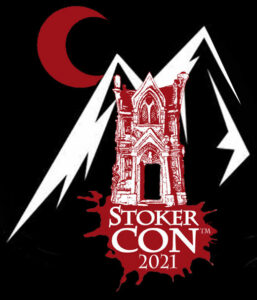Last month I “attended” the virtual StokerCon 2021 conference, run by the Horror Writers Associarion. If you see a conference run by the “[genre] Writers of America” or “[genre] Writers Association”, you can count on there being a lot of panels on writing, editing, publishing, marketing, and other writing-related topics. And that, friends, means it’s a tax write-off if you’re reporting your writing as a business. For that matter, “non-literary” genre conferences or film festivals could be deductible too. If you’re writing fantasy or science fiction, can you write off Worldcon? (WorldCon 2022 will be in Chicago, I’m thinking about going. I lived in Chicago most of my life, so I could combine business with visiting family.) Sure. It’s market research. What’s trending in science fiction? What are people reading/watching? It’s networking, because you can connect with other authors, and maybe with agents and publishers. So keep your eyes open for any genre conferences that fit with what you’re writing.
Before I get into the conference content, here are some things I picked up about being on a virtual panel. First, technology problems happen. A few of the panels spent a lot of time trying to get everyone on screen and on audio. After a few such incidents, some panelists came online with backup devices. One had a computer, a tablet, and a phone ready to go.
Second, lighting is very important. One panelist was sitting under an overhead light, and her video was extremely washed out. A couple of others were sitting in front of windows, so they were barely more than silhouettes. Another was using a ring light, so her video was very good. But she was also wearing glasses, and when she turned her head certain ways she would get a reflection of the light in her glasses, so it looked like she had cartoon-like white circles on her eyes. The lesson here is: If you’re invited to be on a virtual panel, test your set-up first. Connect with some friends and do a rehearsal, and make sure that your video and audio are clear. (On all your devices!)
A couple of other lessons, after attending three virtual conferences. Most of the panels at Stokercon 2021 were pre-recorded. That meant that they could run longer than the allotted 50 minutes. That was a good thing, because it allowed time to fix technical problems. But it was sometimes a bad thing, because the panelists could just keep rambling on.
Also, at a virtual conference you can attend everything! Some sessions are pre-recorded, and live panels may be available to view after the session ends. So you don’t have to clear the room for the next panel. You don’t have to decide between two or three session in the same time slot. But that can result in Zoom/YouTube fatigue.
So what about the content? There were some great panels. The fist one I watched was “The Author-Editor Relationship in the Horror Genre”. (It wasn’t really specific to the horror genre.) I found this one very useful, because I’m pursuing both writing and editing as career paths. And since I’m writing horror, and I like extreme horror, the panel on “Extreme Horror: How Extreme is Extreme?” was relevant.
Other panels that gave me good information were “Author Newsletters: Writing to Your Readers as Well as For Them”, “Humor and Horror”, “Portrayal of Mental Illness in Horror”, and “The Beta Reader Group Panel”.
That last one was a revelation for me, because I didn’t know that beta reader groups were a thing. This was a group of about eight authors—six of them were on the panel—who beta read each others’ books. They talked about how valuable it is to have other authors beta read their work, and how much they learned from each other. One of the authors said that after a few years of doing this, their editors started telling them that they were submitting the cleanest first drafts they had ever seen. Another agreed, and said that they would get their first draft back with only five or six editorial comments.
I’m still processing all the information from the conference, and still catching up on the panels. StokerCon used a platform called “hopin” for recording the panels and managing the conference, and the recordings were posted on YouTube. I bookmarked the ones I didn’t have time for that I was most interested in, because I was already running into YouTube fatigue by Sunday.
The conference also included the Anne Radcliffe Academic Conference, which has some sessions that looked interesting, including “Bathing Beauty: Violence and Vulnerability in the Showers of Horror”, “Disability, Estrangement, and Reframing the Othered Woman in H.P. Lovecraft’s The Dunwich Horror”, “Not Your Typical Mammy: The Subversion of the Mammy Trope in Horror Portrayals of Black Motherhood”, and “Why Is This Possession Different Than All Other Possessions?: Jewish Exorcism Films”. If those aren’t academic titles, I don’t know what is! I just didn’t have enough time to watch any of those.
There was also Horror University, which offered 90-minute to two-hour intensive, hands-on classes with activities and exercises. Some of the sessions were “Bang, Splat: Writing Action & Violence!”, “Breathe New Life Into Old Books: 3 Simple Steps To Rebranding Success”, “Poetry Forms for All Writers”, “The Uncanny and the Abject: Applying Psychology to Your Fiction”. Again, I didn’t have time for these. Plus, they were extra-cost sessions: $65 for one session, $240 for four, or $440 for eight (non-HWA-member prices). I didn’t have the budget for that either.
Oh, and there were author readings too.
Did I get my money’s worth? At the $75 virtual conference price, absolutely. Would I go to an in-person StokerCon? Yes, if finances allowed.
And by the way—StokerCon 2022 is going to be right here in Denver! Am I planning to go? You bet!


How exciting, Kurt. Happy you enjoyed yourself and learned. My hat’s off to anyone that can pull of a great conference.